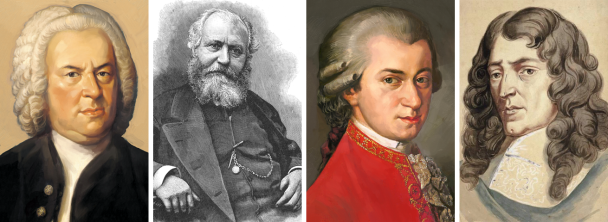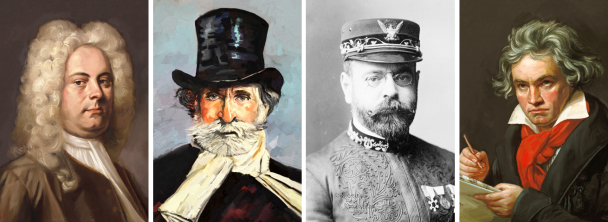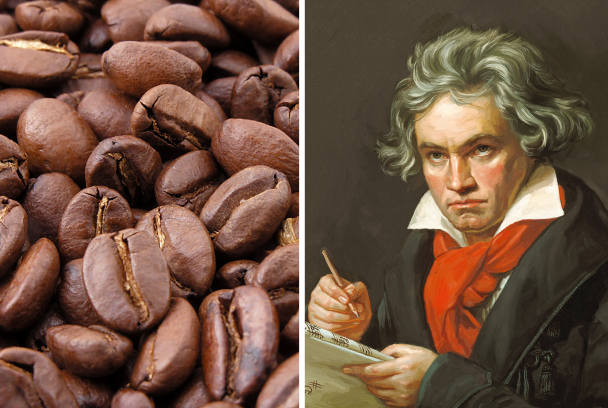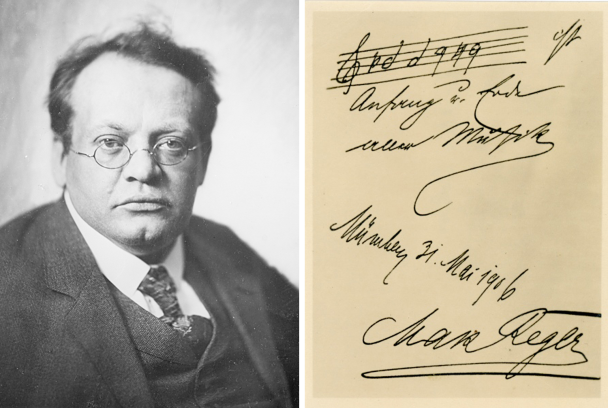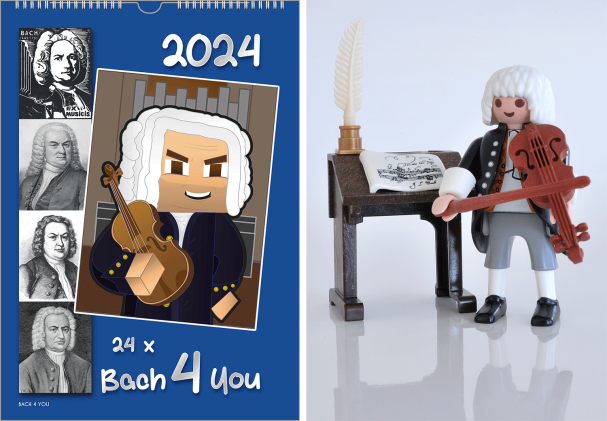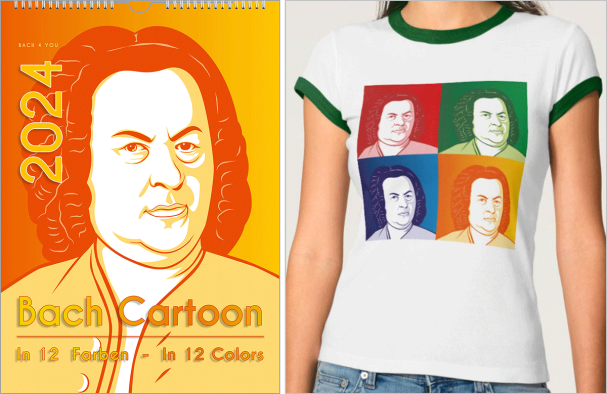
This Whole Page Is Advertisement = Promotion = Commercial
What Is Classical Music? What Is Popular Classic? And What Is Young Classic Then?
So ... what is Classical Music, anyway? And what is then Popular Classical Music? And you can hardly read about Young Classical Music anywhere. Really good answers to these three questions can be found practically nowhere on the internet. Some people do try, in fact Wikipedia and the Bayerischer Rundfunk BR(... Bavarian Broadcast). The "Board of Music" is also at the forefront. But ...
I think the question, what is Classical Music, deserves an extra website. And in the meantime it exists. You can get to it with a click here.
Of course, we – my husband Peter and also I – are always thinking about how best to accompany to Johann Sebastian Bach. In fact kids, teens, teachers, parents and grandparents. And there, after many years, the way via Classical Music in general seemed to us to be an excellent one. But then also via schools. That's why there's my Classical Music Teaching Material, and I've put together a Classical Music Top 100.
With a click on the link here to your right ... you get to all shops. Plus, also to the teaching Material.
How It Is Definitely Not ( ! ) Working
However ... I'm getting to the point now. So ... in the next section, under the first picture. First, my opinion on the other results on the German page 1 on the question "What is Classical Music?". Firstly, it is always about the epoch ( ! ) of classic. That ... is something quite different – and in the sense – as when you speak of Classical Music or ... by proxy ... of just Classic. "I like Classical Music" therefore refers to Classical Music (... as I define it) and not the epoch of classic. Like how "to google" today is synonymous (... a common word) for researching on the internet with any search engine.
So to Board of Music (... in Germany and in German and I translated that for you). That's where it continues. There it also states: "Classical music is art music". What is that? So other music is not art? And it explains that it's not about classical music by Turks, Arabs, Indians and Chinese. Logical, actually, isn't it? And Classical Music offers a "distinction from pop music". What a nonsense: So no demarcation from jazz, folk music, rap, heavy metal, rock 'n' roll? Of course, the terms "serious music" and "entertaining music" just had to be included, even if they don't make any sense as an explanation.
For the serious German newspaper, Badische Zeitung, classical works are "especially valuable" and "timelessly" beautiful. Hmmm, okay.
Ronald Kah, himself a composer, again defines it incorrectly in terms of the question "What is Classical Music?", because this stringing together of words only allows the description of the type of music and not when it was composed. And he thinks it is characterized by the use of classical instruments such as strings and winds ( ? ), but also a combination with a choir. He thinks it is mainly instrumental composition, the melodies are catchy ( ? ) and partly dynamic and rich in contrast ( ? ? ! ! ). Overall, his explanation is perhaps closer to the question "What is Popular Classical Music?" than to the question "What is Classical Music?".
Monique Schätti from Switzerland disqualifies herself with exciting, unusual words, for example, there are "miniature masters" and we learn that greats have also created "third-rate" works. But she then disqualifies herself definitively when she describes André Rieu, a Charlemagne Prize winner (... a very serious German prize) because of his work, as "lowest level". Rieu and his kind of entertainment are loved by tens of thousands of people.
The Bayerischer Rundfunk BR (Bavarian Broadcast BR) is among the top 10 hits on Google, but provides no explanation at all for the question "What is Classical Music".
Rank 9 – today – is Indiepedia. There again, they think that everything that is not folk music (1) or jazz (2) or "experimental" (3) or "avant-garde" (4) is Classical Music, and then they throw in F-music in addition to E-music and U-music. Great, but that doesn't explain what Classical Music is, but makes it even more complicated (... for English-speaking folks: E-music is "ernst", which is "serious" music, U-Music is "unterhaltend", which is entertaining music, and the rare term F-Music is "funktional", which is functional ... I have never heard about that before ...).
At number 10 - also today (... when I wrote these lines) – is finally the Goethe Institute and first dwells on the confusion of classic as an epoch and Classic as another word for "Classical Music". And then they think that Classic is the "music of the concert hall" in general, when this term is not understood to mean the music of this classic epoch. Everything else can be "forgotten," but that's certainly how the institute staff also judges my definition of "What is Classical Music?" Perfect, however, is the heading, because here it actually becomes clear: It is about the classic period as an epoch, as an era, as a period of time. But then I would have omitted the explanatory attempts to the question "What is Classical Music?" in "our sense" altogether.
Many adults know two composers, the third less so, and the one on the right is probably known by only one in 100 classical music fans.
What Is Classical Music, and what Is Popular Classic?
You can't define what Classical Music is. Period. Done. Basta. You can't practically read about what characterizes Classical Music and how to recognize it. And to define it clearly in two, four or ten sentences ... what it is ... is practically impossible. What is Popular Classical Music? Well, if – after my reading offer – we are so almost sure to recognize Classical Music, then "popular" simply means "well-liked". Popular Classical Music is well-liked Classical Music. But because "Popular Classical Music" doesn't really sound good as a musical genre, it is simply called "Popular Classic". And from a certain life experience (... so maybe when you are a bit older than today) you know what is meant. Nowhere on the internet do you read that Classical Music and Popular Classical Music appeal to two different kinds of people.
The composer on the far right is certainly the best known. Then follows the gentleman with the wig on the far left. The one with the top hat is also known to all Classical Music fans, but the one with the medals on his chest is known only to very few Classical Music enthusiasts.
"What is Classical Music?" then? We approach the definition faster on this page of my website "Johann Sebastian Bach for Children" than via the website I open with the page "What is Classical Music?" (... the opener, for example on a newspaper page, is the most important article of the day and there it is the bold print, the so-called teaser, that outlines the content in a few words). So, if you want to get really informed, read on there, because there the section "Popular Classical Music" takes a much bigger space. There you will also find my collection of 300 popular classical masterpieces in the "Classical Music Top 100". Young Classical Music is such Classical Music, which was created for example for movies and musicals only in the last 20 to 50 years. Composers are Morricone, Last, Enya, Vangelis, Webber and Williams.
That's them, or at least a large part of them: the most famous Classical Composers. Sure, Mozart is missing. But also some others.
Sit in front of your TV and zap. Around dinnertime. Again and again. With music, you stay very short. With practically any music, you know: This ... is not Classic, so it's not Classical Music. It works much, much better on the radio, best of all in your parents' car, because success is guaranteed there. While on TV you only very rarely "get past" Classical Music like this, on the radio you can do it in a few minutes. But not on the hour: There's usually news everywhere. 10:15 a.m. is good, 2:15 p.m., 6:15 p.m. and every 15 minutes after the hour in between.
And now? You will definitely find a radio station playing Classical Music after ten minutes at the latest. You just recognize it. This is the kind of music you associate – mentally – with people over 60. Not groovy, sometimes seemingly boring, but often hectic: too much "fiddling", too much " squeaking of women", too quiet piano passages ... all that just for example. So ... my description in these two lines is only to represent what "one" (... you maybe?) imagines to this term. So you have recognized "somehow" Classical Music. What kind of Classic is it? It is 99 percent not ( ! ) Popular Classical Music. We remember, popular is well-liked. But on the radio you don't hear this one percent of Popular Classical Music (... of all Classical Works) and certainly not Young Popular Classical Music.
Ludwig van Beethoven counted out exactly 60 coffee beans for each of his cups of coffee. Does that make him a bean counter?
And why is that? Why don't Classical Radio Stations play Popular Classical Music, and certainly not Young Popular Classical Music? Because there are only about 300 pieces of Popular Classical Music. Moreover, the pieces are becoming less and less popular, but this does not mean that they are becoming less qualitative. No, they are just no longer as loved by the general public as the 300 in my list. Radio Stations like Klassikradio or Bayern Klassik, however (... both in Germany), "serve" mainly very conservative Classic Music fans. In fact, those would immediately switch to other stations if they only played Popular Classical Music. So 99 percent of what you hear there is not going to appeal to you. And you'll only "endure" it for ten minutes – at most – and then switch on. At least that's how it was for me for decades. Although I tried it again and again.
And now the confusion happens: You know, you listen to Classical Music and you realize: You don't like it. You get to the conviction: Classical Music = not my cup of tea. With my approach, however, you immediately find your way to Classical Music, in particular to Popular Classical Music. And also to the Young Popular Classical Music and finally with pleasure ... yes also finally to the Classical Music, as it is defined by so many enthusiastic Classical Music fans. Or rather, it is not, Because even they can not describe what they like about this kind of music.
Max Reger actually wrote this several times when he was asked for an autograph. It is certainly the only handwritten quotation about Bach.
What Then Is "Classical Music"?
"What is Classical Music?" It defines itself first "strangely" with what it is not: Classical Music is not folk music, not jazz, not rap, not Schlager (... a kind of music in Germany), not pop, not "Neue Deutsche Welle" (... New German Wave ... again in Germany), whatever. Classical Music is much composed for church service, for movies, operas, there are waltzes, for ballet, for operettas, for princes (... in former times) and for certain occasions. Finally, experts also composed completely independent themes for no such event, which doesn't really help with the definition either. Classical Music is often played with very, very many instruments, not like music by the Backstreet Boys or the Spice Girls (... earlier) or the "No Angels" (... also earlier).
Classical Music is music that gives you the feeling that you might still like it in ten, 20 or 50 years. Today, PSY blasts out "Oppan Gangnam Style," the world freaks out, everyone listens to the hit until they're sick of it. And that's it. The same thing happens with the hits of Bieber, Helene Fischer (... in Germany) and DJ Bobo (... in Switzerland), maybe not worldwide and not quite as violent. Not that I don't like them all. It could be different with some hits by Abba, the Beatles, Queen, Elvis of course, and maybe the Rolling Stones. And I mean, how often will they still be heard in 100 years? Some of Johann Sebastian's works are around 300 years old, and there are many people who are enthusiastic about many of Bach's songs, not just the popular ones.
Classical Music is also associated with rather conservative, perhaps even festive clothes of the performers. Much more ties are worn, the artists have noble clothes on. Classical Music in general you notice a little bit that they don't seem to be made up out of thin air. The audience is quieter and more conservative. You associate the Johannes Passion with conservative enthusiasts, "Wacken" more with head-banging listeners. With Caroline Reiber (... In Germany) there is rather swaying and clapping, with "Air" by Bach the audience is rather quiet. And again: You can argue so contrary that all ten authors who occupy page 1 at Google today would "put me down".
"What is Classical Music?". Without providing a spot-on answer, however, you know immediately after my reading that it's best not to try to explain it at all. As a student, it's best to remind yourself once again that things "get tricky" when the question doesn't refer to classic as a time period, epoch, or era, that is, when it says, "Who are the composers of the classical period?" Because in this case, the answer can only be: Haydn, Mozart, Beethoven.
Bach calendars and Bach figures: "Bach 4 You" is the specialist. To the shop.
Bach calendars, Bach T-shirts and music T-shirts: "Bach 4 You" is the right Publisher for this. Here you get to the shop ... again.
End ... of Commercial ... of Advertisement ... of Promotion

